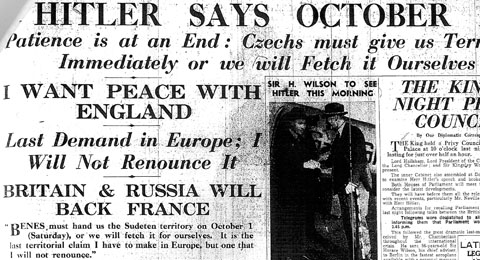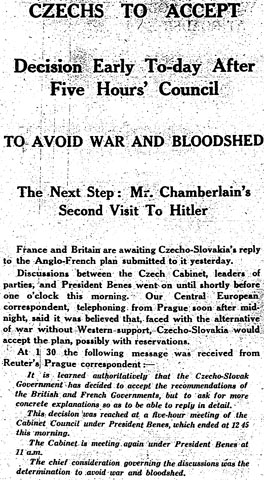
So, Hitler’s big speech — summarised in the Manchester Guardian (p. 11), above — turned out to contain no new demands or proposals, nothing at any rate that was not implicit in Henlein’s Carlsbad speech. But it’s not so much the content as the tone which is worrying: his rhetoric was angry, violent and menacing. The demand he did make was:
I demand that the oppression of 3,500,000 [Sudetens] in Czecho-Slovakia shall end or the right of self-determination shall take its place.
He did not exclude negotiation; indeed, he said that it’s up to Prague to make an agreement with the Sudetens. But he also said:
If the democracies should be convinced that they must protect with all their means the oppressors of the Germans, then this will have grave consequences.
Although it could be read a number of ways, this sounds like a clear warning that Germany is willing to risk war with Britain and France over the Sudetenland. But still there is nothing definite: as the diplomatic correspondent says, ‘The question “war or peace” remains unanswered.’ And that’s the big question, isn’t it?
So the crisis continues. In the letters columns, it’s turning into a war. The Times has two columns of them (p. 8) on that leader from last week on the annexation question. There are those who are disgusted by The Times’s suggestion. From Nigel Law:
When I first read it I assumed that it had somehow strayed from the columns of the Angriff, since it seemed so much at variance with the tenor of the rest of the article in question.
R. E. Godfray:
As an old reader of your esteemed newspaper and an admirer of the steadying influence on public opinion which your leading articles have exercised in the past, may I be permitted to express my utter astonishment at your suggestion on September 7 […]
T. C. S. Lodge:
The line you took was surely a direct incitement to the Nazis to go ahead as they like, come what may, and you have thereby contributed not a little to the doom of democracy […]
Ouch. But The Times has its supporters too. Archibald Ramsay:
Are we to send millions to their deaths in order that the Czechs may continue to deny to the Sudeten Germans that same degree of self-determination which we recently granted the Southern Irish?
Kenneth Macassey:
Once more The Times has accurately and most opportunely ventilated the opinion of a vast number of unbiased citizens of this country. The suggestion that a revision of boundaries ought not to be entirely excluded as a possible solution of the Czech-Sudeten dispute is very much to be welcomed.
There are a couple of interesting letters in the Manchester Guardian too (p. 20). One is from G. E. Lee, who criticises Britain’s failure to uphold collective security in China, Abyssinia or Spain:
War is raging in the world to-day, and may shortly ravage our own towns and cities because we have been unwilling to face this basic obligation to the League, this fundamental of any peace system.
And again:
If to-morrow London and Birmingham and Manchester are faced with what the populations of other cities in other lands have been forced to bear it will be because we have stood supinely by when we might have crushed out the evil thing, and have contented ourselves with thanking the National Government that we had been kept out of war.
So the coming air war will be Britain’s just desserts.
The other is from H. M. Swanwick, a prominent pacifist, the former head of the British Section of the Women’s International League for Peace and Freedom. Here she refuses to join ‘the deafening chorus of attacks on Nazi Germany’:
I loathe all tyranny, whether Bolshevik, Fascist, or Nazi, but I believe that press attacks on foreign countries have no influence for good and rather serve to inflame feeling in the opposite direction to that desired.
She believed that the autonomy plan offered by the Czech government merely ‘proves up to the hilt how undemocratic’ the country must have been.
As to my position, I am a pacifist and believe in always, under all temptation, trying to understand both sides, instead of shutting my eyes and ears and squaring up with one side against the other.
This looks pretty much like the definition of ‘well-meaning but hopelessly naive’. Which is very easy to say, seventy years later.
I’ve been trying not to anticipate future events in these posts, but I’m going to make two exceptions here and look ahead a little. In November 1939, Swanwick committed suicide. I’m not entirely sure why, though she was in poor health, but one must suspect that the coming of war had something to do with it, too. And in May 1940, Ramsay (author of one of the letters to The Times noted above) was interned under Defence Regulation 18B due to his involvement in the Tyler Kent affair (his pro-fascist and pro-German attitudes surely didn’t help, though his anti-Semitism probably didn’t hurt). He was an MP, the only one to be so interned, and was not released until September 1944. In very different ways both Swanwick and Ramsay suffered for their views.
![]() This work is licensed under a Creative Commons Attribution-NonCommercial-NoDerivatives 4.0 International License.
Permissions beyond the scope of this license may be available at http://airminded.org/copyright/.
This work is licensed under a Creative Commons Attribution-NonCommercial-NoDerivatives 4.0 International License.
Permissions beyond the scope of this license may be available at http://airminded.org/copyright/.




That Tyler-Kent thing is fascinating. I never knew.
Brett,
Your inclusion of future events concerning H. M. Swanwick and Tyler Kent are excellent additions to the story. In no way do they detract from your telling of the history “as it happened”. Quite the opposite – they enhance our understanding of the people of the time.
Pingback: Airminded · Wednesday, 14 September 1938
Thanks, Jon, but in general it is my aim not to foreshadow later events here, as I do want to try to capture the uncertainty about the future by sticking to a day by day format. I couldn’t resist, in this case, however …